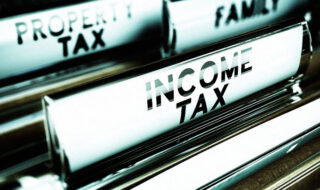February 6, 2024 Last Edit: July 18, 2024
Tax season is around the corner and not only do businesses have to deal with the complexity of tax obligations, NFIB wants to remind small business owners to be weary of tax scams. According to the IRS, “thousands of people have lost millions of dollars and their personal information to tax scams.” It is imperative as a small business owner to stay vigilant when opening and responding to an email, phone call, text, or regular mail that claims to be from the IRS, and that you do not send money or share private information with an illegitimate entity.
In this article we will share red flags, common scammer tactics, and proactive measures you can take to protect yourself and your business.
How to Determine if it’s Really the IRS
The IRS does not initiate contact with taxpayers by email, text message, or social media channels to request personal or financial information. There may be an instance where the IRS does reach out via phone, or even showing up at your residence, but only after attempts to contact you by regular mail have failed. This may occur when a taxpayer:
- Has an overdue bill,
- A delinquent (unfiled) tax return, or
- Has not made an employment tax deposit.
Regardless, you will generally first receive multiple notices and letters from the IRS in the mail.
Common Tax Scams
Scammers will reach out to victims across various platforms whether it be by email, letter, or phone. IRS impersonators will often use threats like arrest or deportation to intimidate victims into paying a fabricated tax bill. Some clear signs that you are receiving an illegitimate letter from the IRS include:
- A notice regarding a tax return when you have not even completed your initial filing;
- Missing an IRS logo;
- Grammatic errors and/or misspelled words;
- A demand for immediate payment (the IRS notices will not contain high pressure language and demand payment);
- Requests for money through irregular payments like gift cards or anything that is not U.S. dollars;
- A notice that you have won something;
- A request for payment to anyone besides the U.S. treasury; and
- A non-official government envelope (IRS mail comes in official government envelopes with the IRS logo).
If you do receive a letter from an impersonator claiming to be the IRS, you can take further steps to verify the legitimacy by:
- Checking for IRS contact information
- Genuine IRS letters will include contact information for further verification. You can cross reference this information with that available on the IRS website.
- Verifying the reference #
- Some IRS letters contain a reference or case #. You can contact the IRS and provide the case # to verify the authenticity of the communication.
- Checking for personalized information
- IRS letters will typically have personal information including your name, address, and other details pertaining to your tax situation. If the letters are lacking personal info, it may be illegitimate.
In 2023, the IRS posted a notice of a new tax scam notifying victims they had an “unclaimed refund.” The new scheme typically arrives via a cardboard envelope from a “delivery service.” The letter includes the IRS masthead and wording that the notice is “in relation to your unclaimed refund.” The letter requests personal information including photos of the taxpayer’s driver’s license and bank account information.
Each year, the IRS produces a “dirty dozen” list of the worst of the worst tax scams from the previous year. You can read the 2023 dirty dozen list here.
Beneficial Ownership Information Reporting Scam
As business owners familiarize themselves with the requirements of the new Beneficial Ownership Information (BOI) reporting requirements, NFIB has learned of a BOI filing scam that requests a filing fee and a demand for personal information. Business owners have been receiving a “Form 4022” (which does not exist in the U.S. tax system) from the nonexistent “Business Regulations Department.” The form demands a $117 filing fee, as well as personal information about you and your business. We want to remind you that all BOI filing goes through FinCEN’s electronic filing portal and is free.
If you have any questions regarding tax or BOI reporting scams, you can reach out to info@nfib.org
NFIB does not provide tax, legal, or accounting advice. This article has been prepared for informational purposes only. You should consult your own tax, legal, and accounting advisor(s) for specific information related to your business.
NFIB is a member-driven organization advocating on behalf of small and independent businesses nationwide.
Related Articles














